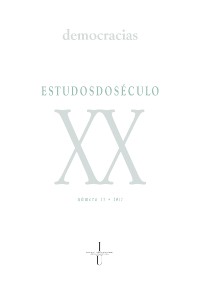Please use this identifier to cite or link to this item:
https://hdl.handle.net/10316.2/91857| DC Field | Value | Language |
|---|---|---|
| dc.contributor.author | Matos, Vera Margarida Coimbra | - |
| dc.date.accessioned | 2017-10-24T10:25:05Z | |
| dc.date.accessioned | 2020-09-24T07:52:33Z | - |
| dc.date.available | 2017-10-24T10:25:05Z | |
| dc.date.available | 2020-09-24T07:52:33Z | - |
| dc.date.issued | 2017 | - |
| dc.identifier.issn | 1647-8622 (digital) | - |
| dc.identifier.issn | 1645-3530 | - |
| dc.identifier.uri | https://hdl.handle.net/10316.2/43097 | - |
| dc.description.abstract | Nos anos 60 e até ao período de transição democrática em Portugal (1974-1976), as relações diplomáticas entre Roma e Lisboa foram utilizadas pelos partidos italianos como arma de ataque político. Durante o Estado Novo, o Partido Comunista Italiano (PCI) e o Partido Socialista Italiano (PSI) usam-nas para atacar o Partido da Democracia-cristã (PDC), líder das sucessivas alianças governativas de centro-esquerda formadas, desde 1963, entre os partidos do centro e os socialistas. O objetivo era aprofundar a abertura à esquerda. Durante a transição democrática, a possibilidade de o PCI entrar no Governo devido à sua base eleitoral leva o PDC e o PSI a utilizar a radicalização de esquerda da revolução portuguesa para enfraquecer a popularidade dos comunistas, acusando-os de quererem instalar em Itália um regime ditatorial estalinista, tal como o Partido Comunista Português, com o qual mantinham estreitas ligações, fazia em Portugal. Simultaneamente, o PCI recorria aos acontecimentos portugueses para pressionar a Democracia-cristã a aceitar uma aliança governativa com os comunistas, chamada compromisso histórico. | por |
| dc.description.abstract | Dans les années 60 et jusqu’à la période de transition démocratique au Portugal (1974-1976), les relations diplomatiques entre Rome et Lisbonne ont été utilisées par les partis italiens comme une arme d’attaque politique. Durant l’Estado Novo, le Parti Communiste Italien (PCI) et le Parti Socialiste Italien (PSI) les utilisent pour attaquer le Parti de la Démocrate-chrétienne (PDC), leader des alliances gouvernementales successives de centre -gauche formées, depuis 1963, entre les partis du centre et les socialistes. L’objectif était d’approfondir l’ouverture à la gauche. Pendant la transition démocratique, la possibilité que le PCI participe au Gouvernement dû à leur base électorale amène le PDC et le PSI à utiliser la radicalisation de gauche de la révolution portugaise pour affaiblir la popularité des communistes, en les accusant de vouloir installer en Italie un régime dictatorial staliniste, tout comme le Parti Communiste Portugais, avec lequel ils maintenaient d’étroites relations, le faisait au Portugal. Simultanément, le PCI a recours aux événements portugais afin de contraindre la Démocrate-chrétienne à accepter une alliance gouvernementale avec les communistes, dénommée engagement historique. | fra |
| dc.description.abstract | In the 1960s and until the democratic transition period in Portugal (1974-1976), the diplomatic relations between Rome and Lisbon were used by the Italian parties as a means of political attack. During the Estado Novo, the Italian Communist Party (PCI) and the Italian Socialist Party (PSI) use those to attack the Christian Democracy Party (PDC), the leader of the successive center-left government coalitions formed, since 1963, between the center parties and the socialists. The aim was to reinforce the left-wing opening. During the democratic transition, the possibility of the PCI entering the Government due to its electoral base incite the PDC and the PSI to make use of the left-wing radicalization of the Portuguese revolution to weaken the popularity of the communists by accusing them of intending to install a dictatorial Stalinist regime in Italy, as the Portuguese Communist Party, with which they kept close ties, was doing in Portugal. Simultaneously, the PCI resorted to the Portuguese events in order to pressure the Christian democrats to accept a coalition government with the communists, known as historic compromise. | eng |
| dc.language.iso | por | - |
| dc.publisher | Imprensa da Universidade de Coimbra | - |
| dc.rights | open access | - |
| dc.subject | Estado Novo | eng |
| dc.subject | Democratic transition | eng |
| dc.subject | Antifascism | eng |
| dc.subject | Center-left | eng |
| dc.subject | Italy | eng |
| dc.subject | Estado Novo | fra |
| dc.subject | Transition démocratique | fra |
| dc.subject | Antifascisme | fra |
| dc.subject | Centre-gauche | fra |
| dc.subject | Italie | fra |
| dc.subject | Estado Novo | por |
| dc.subject | Transição democrática | por |
| dc.subject | Antifascismo | por |
| dc.subject | Centro-esquerda | por |
| dc.subject | Itália | por |
| dc.title | 3D: ditadura, democracia e diplomacia: as relações luso-italianas nos anos 60 e 70 do século XX | por |
| dc.type | article | - |
| uc.publication.collection | Revista Estudos do Século XX nº 17 | - |
| uc.publication.firstPage | 199 | - |
| uc.publication.issue | 17 | - |
| uc.publication.lastPage | 216 | - |
| uc.publication.location | Coimbra | - |
| uc.publication.journalTitle | Revista Estudos do Século XX | - |
| dc.identifier.doi | 10.14195/1647-8622_17_11 | - |
| uc.publication.section | Artigos | - |
| uc.publication.orderno | 12 | - |
| uc.publication.area | Ciências Sociais | - |
| uc.publication.manifest | https://dl.uc.pt/json/iiif/10316.2/91857/239858/manifest?manifest=/json/iiif/10316.2/91857/239858/manifest | - |
| uc.publication.thumbnail | https://dl.uc.pt/retrieve/11614199 | - |
| item.grantfulltext | open | - |
| item.fulltext | With Fulltext | - |
| Appears in Collections: | Revista Estudos do Século XX | |
Files in This Item:
| File | Description | Size | Format | |
|---|---|---|---|---|
| 3d_ditadura__democracia_e_diplomacia.pdf | 161.67 kB | Adobe PDF |  |
Items in DSpace are protected by copyright, with all rights reserved, unless otherwise indicated.
